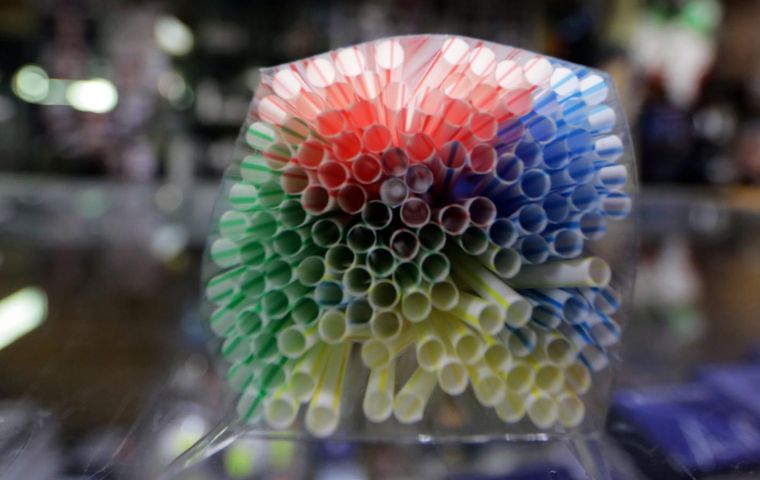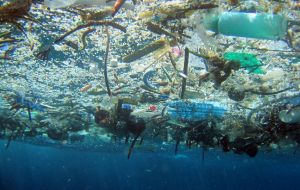MercoPress. South Atlantic News Agency
EU bans use of plastic cutlery and cottons buds by 2021
 Growing concerns about plastic pollution in oceans and stories of dead whales with plastic in their stomachs have prompted the EU to take more drastic steps
Growing concerns about plastic pollution in oceans and stories of dead whales with plastic in their stomachs have prompted the EU to take more drastic steps  Marine litter has come under the spotlight because 85% of it is plastic. Most of the plastic items are the ten most found on EU beaches
Marine litter has come under the spotlight because 85% of it is plastic. Most of the plastic items are the ten most found on EU beaches Single-use plastic items such as straws, forks and knives as well as cotton buds will be banned in the European Union by 2021 following a vote by EU lawmakers last Wednesday as the bloc pushes manufacturers to step up their recycling efforts.
Growing concerns about plastic pollution in oceans and stories of dead whales with plastic in their stomachs, together with China's decision to stop processing waste have prompted the
EU to take more drastic steps to tackle the issue.
Marine litter has come under the spotlight because 85% of it is plastic.
The European Parliament voted by 560 to 35 in favor of banning 10 single-use plastics including plates, balloon sticks, food and beverage containers made of expanded polystyrene and all products made of oxo-degradable plastic. These are the 10 most found items on EU beaches.
EU governments have already signaled support for the ban, making their final approval due on April 15 a formality. The EU had rushed through deliberations on the planned restrictions in less than a year.
The European Commission, the bloc's executive arm, proposed the curbs in May 2018 and representatives of EU governments and the 751-seat Parliament reached a negotiated deal in December.
“Europe is setting new and ambitious standards, paving the way for the rest of the world,” European Commission Vice-President Frans Timmermans said.
Frederique Ries, a Belgian member who steered the draft law through the 28-nation assembly, said: “Plastics poison our seas. If we do not take action, by 2050 there will be more plastic than fish in the oceans.”
EU countries can choose their own methods of reducing the use of other single-use plastics such as takeout containers and cups for beverages. They will also have to collect and recycle at least 90% of beverage bottles by 2029.
Tobacco companies will be required to cover the costs for public collection of cigarette stubs, which are the second most littered single-use plastic item.
The EU recycles only a quarter of the 25 million tons of plastics waste it produces per year. Single-use plastics are disposable plastic-made products that are designed to be used only once over a short time span before being thrown away.
Lobbying group EuroCommerce, whose members include Tesco, Lidl, Carrefour, and Metro, said governments also need to do their part to help make recycling a success.
“Without a proper waste management infrastructure and sufficient recycling facilities we will not achieve a circular economy or the objectives of this directive,” Euro-Commerce Director-General Christian Verschueren said.
Environmentalist group Greenpeace welcomed the ban but criticized the lack of targets for EU countries to follow on some plastics.




Top Comments
Disclaimer & comment rules-

Read all commentsEuros need more finger food. Ultimately slow food will be recognized for its energy inefficiency and cruel damage to Mother Earth.
Mar 31st, 2019 - 04:35 pm 0Commenting for this story is now closed.
If you have a Facebook account, become a fan and comment on our Facebook Page!